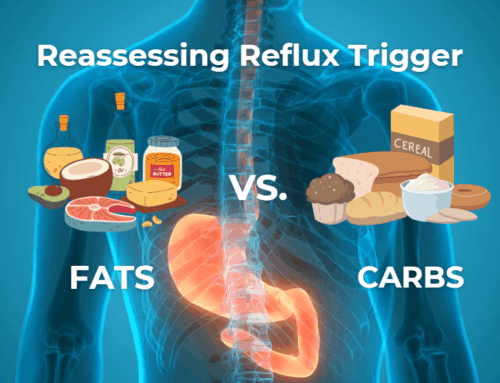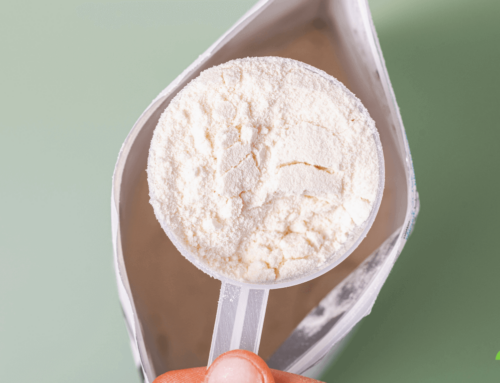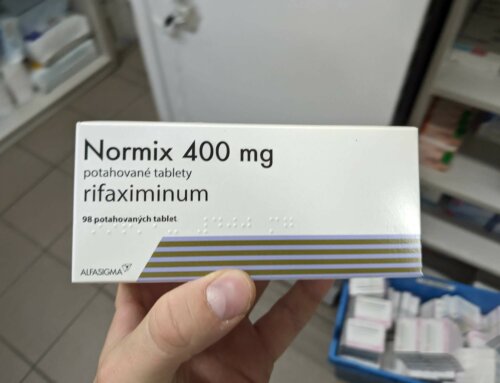“When it comes to SIBO, I have heard SIBO diets are more about managing symptoms. Is it possible, with diet alone to selectively starve the bacteria causing the problem while allowing the good bacteria to increase in order to achieve a balanced microbiota?”
Although this is an interesting question, and I receive many like this, the question portrays a basic misunderstanding. Small Intestinal Bacterial Overgrowth (SIBO) is quite different from a typical GI infection that involves a “pathogen” or “bad bacteria”.
How a GI Infection Differs from SIBO
In the case of infection, the invading organism overpowers the host (us) and host (our) microbes to establish an infection. The infection often involves toxins and other virulence factors that invokes a host inflammatory response often resulting in dramatic symptoms and illness. The host immune response along with having a healthy microbiota is often enough to stop the infection, expel the pathogen and restore a healthy gut.
In the case of SIBO, your own (otherwise healthy) bacteria including bacteria from the large intestine are migrating to and overpopulating in the small intestine. The issue is less “good” vs “bad” bacteria and rather “too many bacteria in the wrong place”. And these SIBO bacteria produce gases and other end products which can damage the small intestine and invoke a variety of symptoms including constipation / diarrhea, abdominal pain, cramping, bloating, distention, reflux, fatigue, etc.
But If “Too Many”, Why not Kill Them with Antibiotics for a Clean Slate?
This is another question I get often and answered in one of my blogs, SIBO Treatment: Antibiotics or Diet? In summary, taking antibiotics is a shotgun approach. It does not discriminate “bad” vs. “good” bacteria. “We don’t want to kill off indigenous small intestinal bacteria that have their own role in digestion and gut health. Many intestinal bacteria are highly resistant to antibiotics or quickly become resistant.” Also, the biggest challenge associated antibiotics is “their lack of effectiveness and a variety of risks associated with antibiotics. And antibiotics don’t address the underlying causes.”
SIBO Diets
The reason that SIBO diets which restrict fermentable carbohydrates have been successful in the clinic has to do with the fact that gut bacteria prefer carbohydrates for most of their energy needs. The latest of these diets is The Fast Tract Diet that limits the full range of fermentable carbohydrates listed in the Textbook of Primary and Acute Care Medicine. The idea is not to “kill” the bacteria causing SIBO or our gut bacteria in general, but rather to put them on a diet, thus reducing their numbers, especially in the small intestine.
While diet is a major key to controlling SIBO, I think about diet and digestive health in holistic and ancestral terms. Our bodies have many systems – immunity, motility, liver/biliary (bile), pancreatic (digestive enzymes), hormonal, metabolic and others that together evolved to modulate gut microbe populations. But it’s not a one-way street with us, “controlling the microbes”. Our microbiota also plays a variety of regulatory roles, for instance co-regulation of bile pool levels, fat metabolism, nutrition, appetite and pathogen control – It’s a mutualistic relationship.
Native or “good” bacteria have adapted to survival in the highly competitive environment of our gut by occupying unique niches based on their highly specialized abilities to break down and utilize a wide variety of mostly complex carbohydrates but other substrates as well.
A nutrient-limited environment (fewer carbohydrates) helps rid our body of bad or pathogenic bacteria, such as C. diff, because pathogens are less able to compete when the going gets tough (they are less competitive). A good analogy is leaving a few pieces of bread for the birds in your back yard. If you overdue it, you can end up with rats. Clearly the health benefits of consuming excessive amounts of fermentable carbohydrates are overstated and need to be balanced with the risk of digestive problems caused or exacerbated by excessive bacterial fermentation.
Beyond Diet
Dietary changes represent a critical element in treating SIBO and dysbiosis including a wide range of related functional gastrointestinal conditions. But there are two other components to the Fast Tract Diet covered in the Fast Tract Digestion books and Fast Tract Diet mobile app that are also critical:
- Learning about and embracing a range of pro-digestive strategies, behaviors and techniques that optimize digestion and minimize malabsorption thus mitigating the effects of carbohydrates
- Identifying and addressing potential underlying factors or conditions that contribute to SIBO / dysbiosis
For optimal gut health, the whole system must be in balance. But our microbiota has become less diverse due to the western diet, easy access to carbohydrate-based foods, antibiotics, preservatives and chemicals as well as over-nutrition in general.
Tips for Establishing Healthy Gut Microbes
When it comes to finding a balance, I think a more nutrient limited environment like our ancestors had is a better suited environment for our gut microbes and our overall gut health. After all, the main reason humans and animals evolved to have gut microbes is to avoid starvation. For this reason, gut bacteria should be quite capable of staying healthy with fewer rather than excess nutrients – that’s where they should shine.
Here are a few more gut healthy tips you can try for improving the diversity of your microbiota:
- Start a garden and compost pile
- Get outside more
- Avoid antibiotics as well as prescription and over the counter medicines
- Avoid food / water poisoning
- Avoid chemicals and preservatives
- Drink more water
- Limit the number of dietary supplements you take and focus on those that serve a specific purpose and show a clear benefit
- Source supplements from reputable suppliers
Read more about supplements here.
When in doubt, a natural / paleolithic approach is the best and safest way to 1. prevent microbial imbalances and 2. restore existing imbalances. I don’t think any of us are smarter than millions of years of evolution. Instead of our current Western practice of over nutrition, training ourselves to eat fewer carbohydrates makes good sense for digestive and overall health.







Leave A Comment
You must be logged in to post a comment.